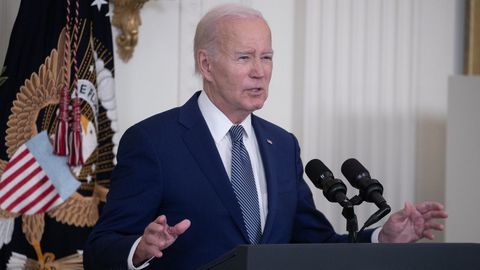
US President Joe Biden MICHAEL REYNOLDS | EFE
“It is still too early to make a final conclusion about where it is going,” warns the president
The US administration doubts that the Russian crisis triggered over the weekend by the rebellion of Yevgeny Prigozhin at the head of Wagner’s mercenary militia can be considered over. Both President Joe Biden and Secretary of State Antony Blinken advocated caution in predicting the effects the situation might have on Moscow.
“It’s too early to make a definitive conclusion about where this is going,” Joe Biden warned Monday from the White House. According to the president, they made it clear that they were not involved and that this was “an internal conflict of the Russian system.”
On Sunday, Biden spoke with Ukrainian President Volodymyr Zelensky. They discussed the Russian crisis and the impact it might have on the war. According to Zelenskiy, the conversation was “positive and inspiring” and led to talks about “expanding defense cooperation”. After the call, the White House released a statement saying Biden “reaffirmed America’s unconditional support.” for the Ukrainian cause.
answers pending
For his part, Secretary of State Antony Blinken acknowledged Sunday that the Wagner Group’s march on Moscow had opened up “all kinds of new questions that Putin will have to answer in the coming weeks and months.” For the foreign affairs chief, the Wagner Group’s brief rebellion represented a “direct challenge to Putin’s authority” and revealed “cracks in the facade” of Vladimir Putin’s authoritarian regime.
“16 months ago, Russian forces were at the gates of Kiev, Ukraine, thinking they could capture the capital within days and wipe the country off the map as an independent state. Now, what we’ve seen is that Russia has to defend Moscow, its capital, against mercenaries,” Blinken said.
On Saturday, Prigozhin ordered Wagner’s mercenaries to stop their rebellion and abandon their advance towards Moscow. It would be based on an agreement with the Kremlin, about which almost nothing happened, except for the fact that it would allow Prigozhin to find refuge in Belarus. “It’s too early to determine exactly where this is going,” said Blinken, the top US diplomat, when asked about the future of the conflict between Putin and the oligarchs. “I guess this is a moving picture and we haven’t seen the last act yet,” he ventured.
The Republican Party shows less reserve when it comes to diagnosing Vladimir Putin’s weaknesses. For Kevin McCarthy, the leader of the House of Representatives, this episode shows that “Putin is much weaker” and that he is “slow in making decisions.” “This brings us closer to resolving the war,” said Chris Christie, the former governor of New Jersey and one of the contenders for the Republican nomination, “because Putin’s weakness is now evident within his own country.”
Source: La Vozde Galicia
I am Amelia James, a passionate journalist with a deep-rooted interest in current affairs. I have more than five years of experience in the media industry, working both as an author and editor for 24 Instant News. My main focus lies in international news, particularly regional conflicts and political issues around the world.







